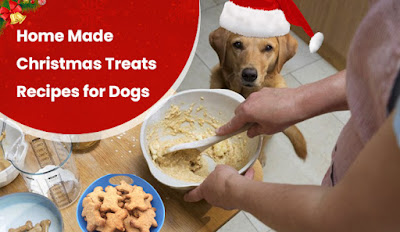It's the end of the year, you must be all set to end it with a beautiful eve for you and your pet. Let's see how can you celebrate well this New Year with your favorite Furry Friend. We have amazing ideas for you and your pet to have a fantabulous New year!
Discountpetcare is an Australian-based pet care company solely established to make shopping for pet essentials easy, convenient, and affordable. With our huge range of pet supplies including flea and tick treatments, heartworms, and other pet products along with pet foods, we ensure to make your shopping easy and best customer service.
Friday, December 31, 2021
Wednesday, December 29, 2021
New Year Sale 2022 | Pet Food & Supplies | DiscountPetCare
Get great deals on New Year Sale 2022 on your favourite dog supplies, cat supplies and pet food products Australia wide. Shop at low prices with FREE SHIPPING. Don't miss out on the best pet deals for 2022 from DiscountPetCare.
Tuesday, December 21, 2021
Home Made Christmas Treats Recipes For Dogs
‘Tis the season to be merry, ‘Tis the season of treats and gifts!
Why should only humans enjoy a beautiful platter of cookies on Christmas? This Christmas, make one such platter of dog-friendly treats for your lovely dog as well. After all, you don’t want them staring at you while you’re enjoying your treats, right?
Here are three easy-peasy recipes for Christmas treats for your dog!
1. Christmas Cookies for Dogs
If you’re running late for the Christmas preps, this one is surely a savior. Dogs love them and they look as festive as all those human Christmas-themed cookies that we enjoy!
Ingredients:
- 1 cup whole wheat flour
- ½ cup Greek yogurt
- ½ cup peanut butter
- 1 tsp baking powder
- Water
Directions:
Mix the ingredients well to make cookie dough out of it. Roll out the dough and cut out the dough into different shapes. Bake for 15 minutes in a preheated oven and call out your pet for the freshly baked treats!
2. Christmas Candy Cane Shaped Dog Treats
If you want to keep up the Christmas vibe with your dog, a candy cane treat may help. Also, your dog will love something different and delicious this festive season.
Ingredients:
- 2 cups whole wheat flour
- ½ cup cornmeal
- 1 Egg, beaten
- ½ cup peanut butter
- Water
Directions:
Mix the ingredients well to make cookie dough out of it. Take a small piece of dough and make small balls out of it. Now roll out the ball into the shape of a small log of about 4 inches using your hands. Take two such dough logs and place them side-by-side to gently twist them together. After you get a braid-like shape, bend it a little from the top to give it a candy cane shape. Bake for 15 minutes in a preheated oven and viola!
3. Apple Mint Christmas Treats for Dogs
These cute little green-colored treats for dogs make great treats for Christmas. The apple in these treats brings out the perfect flavor, whereas the mint aids digestion and helps control bad dog breath.
Ingredients:
- 1 cup whole wheat flour
- 4 tsp milk
- 1/2 cup apple sauce
- 2 tsp chopped spearmint leaves
- Water
Directions:
Mix the ingredients well to make cookie dough out of it. Roll out the dough and cut the cookies into different shapes. Bake for 15 minutes in a preheated oven and delicious dog treats are ready!
Merry & Furry Christmas y’all!
This holiday season, spend some time baking these wonderful dog treats and make your pooch’s Christmas special. And, if you want to make it even more special, gift them their favorite toys or stock up on their favorite treats.
Check out DiscountPetCare for a comprehensive range of toys and treats as we are running a sitewide Christmas Sale to make your Christmas merrier!
Monday, December 20, 2021
Home Made Christmas Treats Recipes For Dogs | DiscountPetCare
Here are the 3 home made christmas treats recipes for dogs. This Christmas, make one such platter of dog-friendly treats for your lovely dog as well. Why should only humans enjoy a beautiful platter of cookies on Christmas? This Christmas, make one such platter of dog-friendly treats for your lovely dog as well.
Thursday, December 16, 2021
All You Need To Know About Feeding Bones To Dogs
Being knowledgeable about canine nutrition is an important component of being a dog parent. It is important that you check what you feed your dog in the same way that you would watch what you eat. An improper and imbalanced diet can lead to a variety of health issues. It’s a good idea to include a range of raw meaty bones in every dog’s diet – they help to maintain teeth and gums healthy and also provide a method to express appropriate chewing behaviour. However, not all bones are suitable for canines. Which ones are they? Why are they unhealthy? Let’s find out.
Quick Tips About Bones!
- The bones must be raw.
- Never feed cooked bones because they might shatter and cause internal harm or intestinal obstruction – all of which can result in a life-threatening situation.
- Only human-grade raw meaty bones are beneficial.
- Consult your veterinarian for guidance.
- Make sure the raw bone is big enough that the dog can’t swallow it whole or fit the entire bone in its mouth.
Is it better to feed cooked or raw bone?
Feed your dog uncooked bones at all times. Raw meaty bones serve to maintain your dog’s teeth and gums healthy, provide additional nutrients, and aid in the cleansing of its digestive tract. Cooked bones should never be fed to your dog since they might shatter and cause internal harm.
Dog Bone Dangers
Some dogs will chew bones their entire lives and never have a problem. Others will have a medical emergency with only one bone. It is partly determined by the dog’s chewing style. The size, form, and kind of bone are also important considerations. Unfortunately, a lot is dependent on luck.
There are a number of risks related with bones and dogs. These issues can arise in dogs after they consume bones.
Fractured teeth: Bones are tough enough to break your dog’s teeth, prompting root canals or tooth extractions.
Oral injuries: Rough edges of bones can cause oral injuries by cutting your dog’s gums, tongue, and other oral mucous membranes. This is not only painful for your dog, but it may also be quite messy. Bones can sometimes become lodged in the mouth, particularly between the lower jaw’s molars.
Respiratory intrusion: The bone may slide down the throat and become trapped, obstructing the airway and causing your dog to choke.
Gastrointestinal tract difficulties: Bones travelling through the digestive tract can cause considerable injury. A bone fragment might become trapped in the throat, stomach, or intestines. Most of the time, emergency surgery is required to remove the bone. Vomiting, diarrhoea, or constipation are all possibilities. This can also result in a potentially fatal situation.
Can Dogs Eat Any Kind of Bone?
Dogs absolutely love bones, but that doesn’t mean they should be allowed to eat them all the time. The risks linked with giving bones to dogs apply to all types of animals’ bones, whether raw or cooked. Cooked bones, particularly those from fowl, provide the most risk due to their proclivity to splinter.
Consult your veterinarian about raw turkey necks if you want to give your dog raw meaty bones. Although not all vets and animal nutrition experts agree that they are safe, they are mostly made of cartilage and soft bones. As a result, when uncooked, they may be classified digestible.
Recommended Bone Alternatives for Dog:
WHIMZEES RICE BONE M-L VALUE BAG
Whimzees Rice Bone is a chewable vegetarian, gluten-free dental treat for dog. It is made entirely of natural components and has a traditional bone form that will entice your dog.
YOURS DROOLLY MILK VEGETABLE KNOT BONE WITH CHICKEN
Milky Knot Bones is the ideal treat to offer dogs. It is made with a vegetable-based, soft and chewy milky bone infused with a buttermilk flavour and scent sealed with a delicately wrapped actual chicken flesh strip.
Even if you have formerly fed bones to your dog without incident, this does not guarantee that everything will be good the next time you feed a bone. So always remember before giving your dog any form of bone or chew, make sure you understand the risks and for more advice or information consult a vet or dog nutrition expert.
Friday, December 10, 2021
Various Ways To Protect Your Cat From Fleas
Are you a cat lover? Do your cat scratches, chews or self-bites her skin? This behavior may be because of fleas on cats. Fleas are parasites and cat can get fleas anytime. These fleas are rigid and hard to remove from the fur of cats. Fleas suck the blood of your furry pal hence it is important that you control it. Let’s get jumped into some of the various ways how you can rid fleas out of your cat and stop self-biting of your cat.
Spot-On Treatment:
Spot-On treatment is more convenient, safer, and easy to apply on the cat. Various non-harsh ways like flea shampoo, flea comb, flea powder, and spray are the best to apply on cats to remove the fleas Regular use of such stuff removes the fleas.
Hygiene Environment:
Because fleas are one of the rigid insects, you may not know when it can attack cat. Hence, you need to identify the environment where your cat rambles. You need to clean those areas very well. Carpets and doormats are the home of fleas from where fleas can come on cats. Hence, wash it on a regular basis or vacuum it.
Bathing:
The effective way of controlling the fleas is to use shampoo or soap. Use normal mild shampoo to clean the cat and soap which are non-scented and natural. If your cat has very short hair, you can also use comb. This habit will prevent your cat from fleas and ticks.
Use of Traps:
There are many traps available to attract and kill fleas effectively. You can place sticky paper sheet or duct tape or a mixture of soap and water near a light which are the most favorite place of fleas. The traps will reduce flea infestation.
Oral Flea Medicine:
Cat has a problem of parasites, fleas and ticks. Use oral flea tick medicine for cats available in the form of liquid or tablets, which is the perfect way to control the fleas and ticks. One common myth in cat lover is liquid medicine will reduce the fur of your cat. But you should read ingredient of the medicine before you give it to the cat and use it as and when needed. If you are hesitating to use such a medicine you can choose homeopathic or natural ways to control fleas.
Let’s protect your kitty from fleas before it spread the infection to human. You may not remove the fleas permanently, but definitely, control them.
Thursday, December 9, 2021
Hill’s Prescription Diet | Are These Diets Really Helpful For Cats? | DiscountPetCare
Learn Hill's Prescription Diet foods are really helpful for cats? Hill’s Prescription Diet is one such brand that is specifically into catering to the health conditions of dogs & cats with its specially designed diets.
Monday, December 6, 2021
Unknown Facts About Worms In Dogs And Cats
Worms are most commonly found in canines and felines. They can cause illness in affected pets and may also lead to serious complications in severe cases. But the good news is that the worm infestation can be prevented and treated. Here are basic facts you need to know about the worms and how to keep your pet protected from them.
Fact: Worms Can Be Anywhere
- Your pet can get infected by the worms from many ways and from anywhere such as: backyards, parks, paddocks and beaches which can be transmitted by other infected animals, birds or insects.
- New born puppy or kitty can be infected through their mother, it can be transmitted through feeding the milk to young ones by mother.
- Worms infect pets directly penetrating their skin or sometimes it may be transferred in a bite of insect.
- Pets who eat rodents like mice, birds etc, these pets may be at higher risk of many intestinal worms.
- Worms produce more than 200000 eggs per day and remain infectious in the environment for several years.
- Worms get into your pet and make them sick.
Fact: Range Of Worms Which Can Infect Both Dogs And Cats
- Intestinal Worms: They live in your pet’s intestine and feed on intestinal contents and blood.
- Lung Worms: They are mostly found in cats. Lung worms damage the lungs and cause breathing problems and difficulties.
- Heart Worms: They are deadly worms, which are largely found in dogs. Heart worms are transmitted to your pet by infected mosquitoes.
- Heart worms live in the heart surrounding the blood vessels of your pet and also travel in the blood stream
- They can live up to 7 years and grow up to 27cm in length.
Fact: Keeping The Worms At Bay
- Do not allow your pet to eat the rodents like mice, reptiles etc.
- Control the pests in your environment and house like mosquitoes, fleas, mice, snails, slugs etc.
- Provide high quality food and offer activities to reduce their drive of hunt.
- Clean the pet bedding’s on regular basis.
- Empty and clean the cat litter trays daily and remove the poo as soon as possible.
- Treat your pooch or kitty with an intestinal wormer regularly.
- Make sure you wash your hand thoroughly after playing with your pet.
Protect Your Canine And Feline From Worms:
Parasites like fleas, ticks, mosquitoes etc can transmit worms to your dog or cat. To protect your pet from the worms, you need to control the pests. Give the regular treatments or preventatives to your pets to control the fleas, ticks and mosquitoes such as:
There are also preventatives for worms such as:






